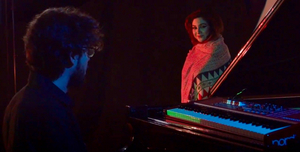Review: ZAHHAK, THE LEGEND OF THE SERPENT KING! at Boston Experimental Theatre
This inventive collaboration is streaming this weekend only

Ready or not, a wave of solo and duo performances is about to crash on the shores of America's regional theatres, thanks in no small part to our government's ineptitude in the face of managing a pandemic (or failing to do so). As gathering restrictions dwindle, a one or two person performance seems the easiest way to program works which will allow for safe distances between people on stage and off, but a solo performance is no easy feat. I have already avoided two requests to sit through and review productions of Jason Robert Brown's musical The Last Five Years. If I need to sit through a major musical about a woman's relationship with an evil guy, I prefer he at least kill people to bake into pies or crash a chandelier from the ceiling of the Opera Populaire or that an enchanted candlestick does a song and dance. Last summer, outdoor cabarets, historical tours, and other small cast shows drenched Boston's theatre scene, but I was wary to attend any of them for reasons equally reliant on the potential spread of the virus and lackluster advertising campaigns which failed to make most seem worthwhile.
Before the closure of performance spaces, I reviewed Sutton Foster's concert hosted by Celebrity series of Boston. The songs she performed were framed in stories about her life, but according to the evening, her life's trajectory was not sufficient material for a solo show. She performed theatre in high school, then she was on Broadway a bunch, she did TV for a bit, and now she has a daughter. Anecdotes shared hardly helped give structure to her series of medleys from the American songbook.
Like a memoir or a documentary, the solo show relies equally upon content and form to succeed. Bland subject matter or shoddy craft can be deadly to these arts. Recently, the Worcester Art Museum hosted a live-streamed performance by Shunsuke Yamaguchi or the Kamishibai Man. Kamishibai is a Japanese style of street storytelling which dates back to the twelfth century and relies on a narrator with painted illustration cards to weave epic tales. Yamaguchi was charming and lively, amicably improvising the traditional stories which included magic, hulking demons called oni, interpolated references to pop culture, and battles of good versus evil. The hour long stream worked because the stories were exciting and Yamaguchi's illustrations were bold, silly, and charming in their evidently homespun renderings. The performers who traditionally biked these stories from village to village, or the kamishibaiya, would often sell candy to draw crowds of children to their shows. This summer, Boston's theatres could easily draw crowds by inviting solo shows by artists like Yamaguchi onto their stages.
Streaming this weekend, Boston Experimental Theatre Company's latest offering, Zahhak, the Legend of the Serpent King! is another sample of a paired down performance that actually works. Artistic director Vahdat Yeganeh has adapted, along with strong collaborators, a narrative from Abul-Qâsem Ferdowsi's ancient Persian epic, Shahnameh as an experimental duet between an actor and a jazz musician. Right away, the source material is engaging, fantastical, and speculative. For a western audience, this seems the equivalent of boiling down The Odyssey or The Suppliants to its philosophical barebones and staging it with two performers in a black box space.
Even in this filmed iteration, Donya Pooli-Yeganeh gives a tangibly athletic performance. Notedly drawing from the Persian storytelling style Naghali, Pooli-Yeganeh is captivatingly lit in dual tone lighting as she delivers a marathon of narration and contorts her body into the many fantastical characters enlisted in the tale. A stark image immediately following the overture sees her limbs contorted and tangled in space, enmeshed with the limbs of her own shadow. This image serves as a perfect jumping off point for this intricate story and is reflected in the climax and closing image of the performance, where it is further entangled with the overlay of hands at a keyboard.
Though the description of the performance warns that the performance will fuse Eastern and Western theatre techniques, the result does not seem to be a Persian assimilation into an Anglo-American theatrical format. Rather, the team has generated the work through improvisations in the methods of Antonin Artaud and Jerzy Grotowski, and thus the physicality of the work is intense, expressive, and perfectly illustrative of the text. This is a mixture of cultures at its best.
Engin Ozsahin elevates the role of musical accompanist to narrative conspirator, and his underscoring highlights, accents, and elevates the narration exquisitely. The text becomes lyric as actor and musician begin rhythmically clapping together and voice and instrument likewise fuse into a duet of percussive sounds landing somewhere between story, poem, and song.
Promisingly, the current iteration is presented with a request for feedback. After streaming both this performance and their successful M(O)ther, I am excited to see where these collaborators go next. In the tradition of Grotowski, the growth for this piece should be to question the elements which may still quantify as excess. While there are a smattering of impactful moments within a concisely driven performance, there are still elements which could be further minimized for greater effect. For instance, Pooli-Yeganeh relies on a few key props and masks in her storytelling, but none are ever employed for as powerful an image as when she is using her hair or a scarf as a puppet. Were I in the room, acknowledging the collaborative, minimalist process being undertaken, my question would be, 'how much of this can we recreate with just your hair?' I would love to see her marathon performance elevated even further by eliminating technical elements and leaving one narrator and one musician alone in a space to relay an epic, ancient tale with only the aid of a scarf.
Stream the performance until Sunday here.
Comments
.png)
|
.png)
|
Videos

